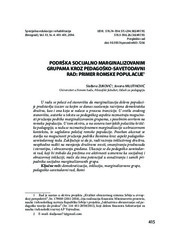Приказ основних података о документу
Podrška socijalno marginalizovanim grupama kroz pedagoško-savetodavni rad: primer romske populacije
Supporting socially marginalized groups through pedagogical counseling the case of Roma population
| dc.creator | Zuković, Slađana | |
| dc.creator | Milutinović, Jovana | |
| dc.date.accessioned | 2021-08-25T10:35:42Z | |
| dc.date.available | 2021-08-25T10:35:42Z | |
| dc.date.issued | 2014 | |
| dc.identifier.issn | 1452-7367 | |
| dc.identifier.issn | 2406-1328 (eISSN) | |
| dc.identifier.uri | https://www.casopis.fasper.bg.ac.rs/ | |
| dc.identifier.uri | http://rfasper.fasper.bg.ac.rs/handle/123456789/3405 | |
| dc.description.abstract | U radu se polazi od stanovišta da marginalizacija delova populacije predstavlja izazov sa kojim se danas suočavaju razvijena demokratska društva, kao i ona koja se nalaze u procesu tranzicije. U svetlu ovakvog stanovišta, autorke u tekstu sa pedagoškog aspekta razmatraju mogućnosti pružanja podrške marginalizovanim grupama, s posebnim osvrtom na romsku populaciju. U tom okviru, a na osnovu teorijskih polazišta kritičke pedagogije, u radu se razmatra fenomen marginalizacije u obrazovnom kontekstu, te sagledava položaj romske populacije. Poseban akcenat se stavlja na mogućnosti pružanja podrške Romima kroz aspekt pedagoškosavetodavnog rada. Zaključuje se da je, radi razvoja inkluzivnog društva, neophodno raditi na menjanju društvene svesti, smanjivanju predrasuda i stereotipa, i obrazovanju građana. Ukazuje se da pedagoško-savetodavni rad, koji bi trebalo da prožima sve aktivnosti usmerene ka socijalnoj i obrazovnoj inkluziji, može da ima potencijal u osnaživanju i samih pripadnika socijalno marginalizovanih grupa. | sr |
| dc.description.abstract | The paper starts from the standpoint that marginalization of segments of population is a challenge which democratic societies, as well societies in the process of transition, face today. In light of such standpoint, the authors of the paper consider the possibilities of providing support for marginalized groups from pedagogical aspects, with a special focus on the Roma population. In that framework, based on the theoretical starting points of critical pedagogy, the paper analyzes the phenomenon of marginalization in the educational context, and examines the position of the Roma population. Special emphasis is placed on the possibility to provide support for the Roma population through the aspect of pedagogical counseling. The conclusion is that in order to enhance the development of the inclusive society, it is necessary to work on changing social awareness, reducing prejudices and stereotypes, and the education of citizens. It is indicated that pedagogical counseling, which should permeate all the activities directed to social and educational inclusion, may have the potential to empower members of socially marginalized groups themselves. | sr |
| dc.language.iso | sr | sr |
| dc.publisher | Univerzitet u Beogradu - Fakultet za specijalnu edukaciju i rehabilitaciju | sr |
| dc.relation | info:eu-repo/grantAgreement/MESTD/Basic Research (BR or ON)/179010/RS// | sr |
| dc.rights | openAccess | sr |
| dc.rights.uri | https://creativecommons.org/licenses/by-sa/4.0/ | |
| dc.source | Specijalna edukacija i rehabilitacija | sr |
| dc.subject | demokratizacija | sr |
| dc.subject | inkluzija | sr |
| dc.subject | marginalizovane grupe | sr |
| dc.subject | pedagoško-savetodavni rad | sr |
| dc.subject | Romi | sr |
| dc.subject | democratization | sr |
| dc.subject | inclusion | sr |
| dc.subject | marginalized groups | sr |
| dc.subject | pedagogical counseling | sr |
| dc.subject | Roma population | sr |
| dc.title | Podrška socijalno marginalizovanim grupama kroz pedagoško-savetodavni rad: primer romske populacije | sr |
| dc.title | Supporting socially marginalized groups through pedagogical counseling the case of Roma population | sr |
| dc.type | article | sr |
| dc.rights.license | BY-SA | sr |
| dc.citation.epage | 431 | |
| dc.citation.issue | 4 | |
| dc.citation.rank | M51 | |
| dc.citation.spage | 415 | |
| dc.citation.volume | 13 | |
| dc.identifier.doi | 10.5937/specedreh13-7256 | |
| dc.identifier.fulltext | http://rfasper.fasper.bg.ac.rs/bitstream/id/2631/bitstream_2631.pdf | |
| dc.type.version | publishedVersion | sr |


